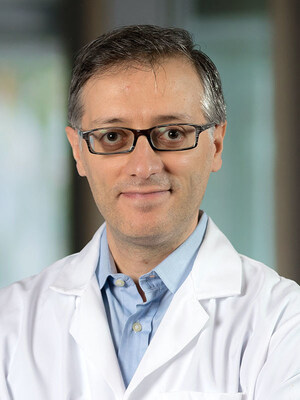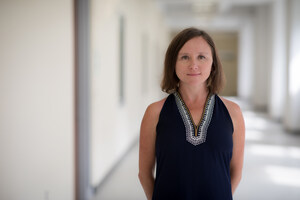BRONX, N.Y., Jan. 9, 2014 /PRNewswire-USNewswire/ -- Roadside bombs and other blasts have made head injury the "signature wound" of the Iraq and Afghanistan conflicts. Most combat veterans recover from mild traumatic brain injury, also known as concussion, but a small minority experience significant and long-term side effects.
(Logo: http://photos.prnewswire.com/prnh/20120531/DC16559LOGO)
Now, researchers at Albert Einstein College of Medicine of Yeshiva University, in cooperation with Resurrecting Lives Foundation, are investigating the effect of repeated combat-related blast exposures on the brains of veterans with the goal of improving diagnostics and treatment.
Mild traumatic brain injury can cause problems with cognition, concentration, memory and emotional control as well as post-traumatic stress disorder (PTSD). Einstein scientists are using advanced MRI technology and psychological tests to investigate the structural and biological impact of repeated head injury on the brain and to assess how these injuries affect cognitive function.
"Right now, doctors diagnose concussion purely on the basis of someone's symptoms," said Michael Lipton, M.D., Ph.D., associate director of Einstein's Gruss Magnetic Resonance Research Center. "We hope that our research will lead to a more scientifically valid diagnostic technique—one that uses imaging to not only detect the underlying brain injury but reveal its severity. Such a technique could also objectively evaluate therapies aimed at healing the brain injuries responsible for concussions." Dr. Lipton is also associate professor of radiology, of psychiatry and behavioral sciences and of neuroscience at Einstein and medical director of MRI services at Montefiore Medical Center , the University Hospital for Einstein.
The Einstein researchers are studying 20 veterans from Ohio and Michigan who were deployed in Iraq and Afghanistan and have exhibited symptoms of repeated concussion. Twenty of the veterans' siblings or cousins without concussion are acting as controls. The researchers are using an advanced MRI-based imaging technique called diffusion tensor imaging (DTI) to identify injured brain areas.
DTI "sees" the movement of water molecules within and along axons, the nerve fibers that constitute the brain's white matter. This imaging technique allows researchers to measure the uniformity of water movement (called fractional anisotropy, or FA) throughout the brain. Abnormally low FA within white matter indicates axon damage and has previously been associated with cognitive impairment in patients with traumatic brain injury. (The researchers also use DTI in an ongoing study of amateur soccer players to assess possible brain injury from repeatedly heading soccer balls.)
The final group of veterans is scheduled to visit Einstein for testing in February 2014. Preliminary results should be available later this year.
Resurrecting Lives Foundation recruited the veterans and their family members and facilitates their visits to Einstein. The Foundation is also funding the research itself. The foundation's mission is to assist in the recovery and reintegration of veterans with Traumatic Brain Injury (TBI) from Operation Iraqi Freedom and Operation Enduring Freedom.
"At Resurrecting Lives Foundation, we honor our fallen heroes by caring for their brothers and sisters who return," said Chrisanne Gordon, M.D., founder and chairwoman of the foundation. "The research Dr. Lipton and his team are conducting will help us fulfill this mission."
About Albert Einstein College of Medicine of Yeshiva University
Albert Einstein College of Medicine of Yeshiva University is one of the nation's premier centers for research, medical education and clinical investigation. During the 2013-2014 academic year, Einstein is home to 734 M.D. students, 236 Ph.D. students, 106 students in the combined M.D./Ph.D. program, and 353 postdoctoral research fellows. The College of Medicine has more than 2,000 full-time faculty members located on the main campus and at its clinical affiliates. In 2013, Einstein received more than $155 million in awards from the NIH. This includes the funding of major research centers at Einstein in diabetes, cancer, liver disease, and AIDS. Other areas where the College of Medicine is concentrating its efforts include developmental brain research, neuroscience, cardiac disease, and initiatives to reduce and eliminate ethnic and racial health disparities. Its partnership with Montefiore Medical Center, the University Hospital and academic medical center for Einstein, advances clinical and translational research to accelerate the pace at which new discoveries become the treatments and therapies that benefit patients. Through its extensive affiliation network involving Montefiore, Jacobi Medical Center–Einstein's founding hospital, and five other hospital systems in the Bronx, Manhattan, Long Island and Brooklyn, Einstein runs one of the largest residency and fellowship training programs in the medical and dental professions in the United States. For more information, please visit www.einstein.yu.edu and follow us on Twitter @EinsteinMed.
SOURCE Albert Einstein College of Medicine
WANT YOUR COMPANY'S NEWS FEATURED ON PRNEWSWIRE.COM?
Newsrooms &
Influencers
Digital Media
Outlets
Journalists
Opted In






Share this article